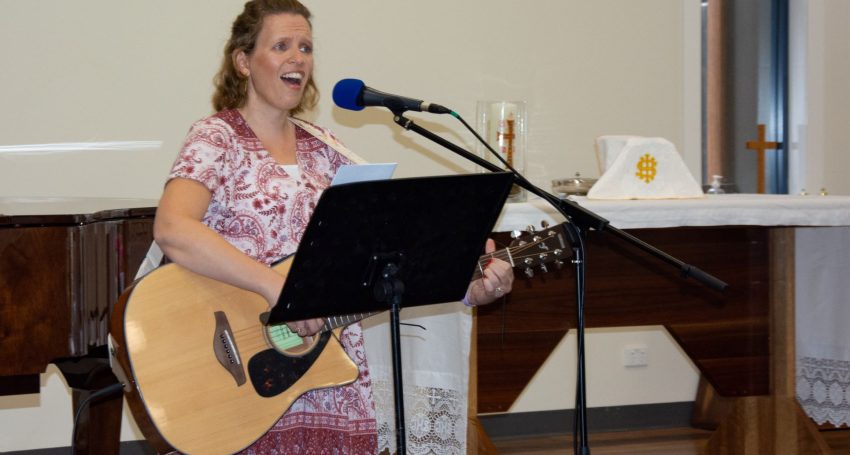How to write worship music
Resources & Research
“I have been writing worship music for nine years. I never planned to be a songwriter, but a trusted friend felt God impress upon her that I had songs within me to release. I nearly laughed when she told me this – the idea seemed so absurd. Yet when I sat down for the first time to write, I found an unexpected joy. I knew I’d discovered a new part of myself,” says Penny Howchin from St Andrew’s, Springfield

I grew up in the Church. And, for as long as I can remember, I have known many wonderful truths about God. Yet it took some time before I deeply experienced His presence. I didn’t know what I was missing until as a teenager my family visited a church experiencing a great revival. Through collectively singing worship to God, I encountered Him. For the first time, I didn’t feel like I was singing to the ceiling. When I experienced the Holy Spirit’s presence, it changed the entire trajectory of my life. That moment became the first of a thousand times I would deeply connect with God through music and learn to engage with His presence in an ongoing way.
As I discovered that day, music provides a wonderful means of worship and connection with God. It helps people engage their whole self. Worship songs allow people to connect with God mentally because they focus on the lyrics and sing truth. Music, by its very nature, also encourages us to feel, giving us the opportunity to go into deeper places within ourselves. In this way, music helps us bring our hearts before God and engage our spirit with His and respond.
Singing together as a congregation also builds unity and faith. It has the power to help us find common ground, uniting us in our amazing diversity. For example, at a sporting match we find diverse groups singing national anthems and team songs together. Fans unite around something they agree is important, and singing together fosters connection and belonging. In much the same way, as we sing in church, we encourage one another and unite as a body declaring the truths upon which our faith is built.
Advertisement
I have been writing worship music for nine years. I never planned to be a songwriter, but a trusted friend felt God impress upon her that I had songs within me to release. I nearly laughed when she told me this – the idea seemed so absurd. Yet when I sat down for the first time to write, I found an unexpected joy. I knew I’d discovered a new part of myself.
In my experience, writing a song happens in different stages. The first inspiration, when a “hook” pops into my head, is exciting. It’s often at an unusual time when I’m doing something mundane. The chorus for my song, “Hold On”, popped into my head while I was pressure cleaning the patio. When this happens, I stop and record a voice note in my phone. When possible I’ll write it in my book, along with ideas for the rest of the song.
Once I have a draft or pieces of a song, the work of songwriting begins. Sometimes songs flow quickly and I’ll write one in an afternoon. At other times, a song will take months to complete as I reflect on the truth God is revealing. It’s important that I take my time with this process and to keep faithfully working. As the ideas develop, I write, edit and practise. Eventually I’ll record something I can share with friends using a basic home set-up and adding in different instruments and vocal harmonies.
Advertisement
To write worship music, it’s important to allow “space” – to focus on God, reflect on what He’s teaching in that season and any response to it. I’m a mother of three and I work part-time, so I understand being busy. However, I have found time and again that I need to make space for God, so I avoid running dry spiritually and so I can write.
Finally, it’s helpful to remember that worship music is a gift to God. There’s no right or wrong instrument or musical style. We naturally have preferences for songs and styles, and we are blessed that we can tailor our personal playlists to match, helping us connect with God in our preferred way. But God doesn’t have a favourite musical genre. He created music and enjoys every style. I think God’s priorities are the state of our hearts and whether our worship is genuine.
10 top tips for worship song writing
- Decide on the purpose of your song. Who is the intended audience and what is your key message? The purpose will guide your lyrics and melody.
- Include a “hook”. Every good song has a catchy part that sticks in people’s heads.
- Tell the story. Don’t rush to the hook or key idea in your first verse. Set the scene and build up to it.
- Allow for dynamics. A good painting includes both light and shade, and a good song does the same. Vary the volume and intensity in different sections.
- Record fresh ideas. New ideas for lyrics and melodies pop up at unusual times. Record or write these into your phone immediately so you remember them.
- Separate creating time from editing time. If you critique your new ideas too heavily as they are forming, you can stifle creativity and this can lead to “writer’s block”. Write down everything, then edit your new ideas later.
- Share your fledgling song with a trusted friend. Lyrics can be interpreted differently by people, so share your work with someone who will give you honest feedback.
- Set aside time. It’s wonderful to write when inspiration strikes, but you rarely feel “inspired” to edit and finish a song, so dedicate time for this.
- Don’t give up. Songwriting is a learned skill and you will improve as you practise.
- Be yourself before God. Be true to your sound, heart and experience. God made you unique and wants your work to be also.
Editor’s note: St Andrew’s, Springfield music coordinator Penny Howchin recently released a worship music album called Floodgates. It is available On Penny’s website or search for it on your favourite music streaming platform.





